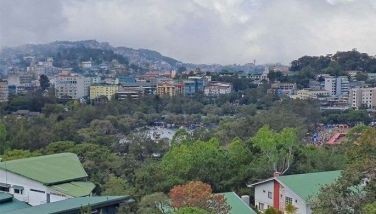PNP: No specific terror threat
MANILA, Philippines - Amid a scare arising from some foreign embassies’ travel advisories, the national police said yesterday it has not detected any specific terror threat but is on high alert.
“Police visibility and round-the-clock patrols must be maintained in all strategic places and areas of convergence and intensify the conduct of intelligence monitoring to anticipate terrorists’ courses of action in coordination with the AFP (Armed Forces of the Philippines) counterparts,” Philippine National Police (PNP) chief Director General Raul Bacalzo said, referring to the orders he gave to his men.
National Capital Region Police Office (NCRPO) spokesman Senior Superintendent Deonardo Carlos gave the same assurance and even encouraged the public to enjoy the Christmas season, as a sufficient number of policemen would be deployed across Metro Manila to ensure the public’s safety.
“After observance of All Saints’ Day, we will continue the deployment of tourist cops and MASO (motorized anti-street crime operatives) as well as improve police assistance desks throughout the Yuletide season,” Carlos said.
But as officials agonize over the terror alerts issued by the United States, Britain, Canada, Australia, New Zealand and France, security forces announced the seizure of explosives in different parts of the country.
Bacalzo, meanwhile, also ordered NCRPO director Chief Superintendent Nicanor Bartolome to beef up security around West Tower condominium and the Magallanes flyover in Makati City, where a leak in a fuel pipeline had been discovered. He said the busted pipeline is vulnerable to terror attacks.
The PNP chief also said he had ordered tighter security for shopping malls, airports, conference centers, foreign embassies, government offices and other vital installations across the country.
He also noted that power lines as well as communication and transportation facilities are now under heavy security.
“We assure the public that your Metro Manila police is doing its best to keep you safe in Metro Manila, all police nationwide will assure your safety, we will double our efforts to ensure your safety,” NCRPO’s Carlos said.
Explosive materials
With the heightened security, police have seized materials that could be used for making bombs in Bataan, Cotabato City, and Quezon province.
In Padre Burgos, Quezon, Army soldiers arrested on Thursday two suspected communist rebels while they were allegedly trying to load 135 sacks of ammonium nitrate on a boat.
Southern Luzon Command (Solcom) spokesman Col. Generoso Bolina identified the arrested suspects as Michael Villapena and Pedro Samson. Ammonium nitrate is used as fertilizer but can also be an ingredient for the production of explosives.
Solcom explosive experts said the seized materials can produce 1,700 kilograms of TNT, enough to destroy a three-story building.
Solcom chief Lt. Gen. Roland Detabali said “continuous and collective efforts” of the Army and the police led to the seizure of the sacks of ammonium nitrate.
In Bataan, police dug up 428 kilograms of ammonium nitrate in 18 bags in Mariveles and recovered nine stolen tubes of dynamite in Limay.
Arrested in the Mariveles operation were Teresita Macapagal and Ricardo Acayan.
Senior Superintendent Arnold Gunnacao, Bataan provincial police director, said the combined haul can create an explosion that can cause damage within a 400-meter radius.
“It will be dangerous when the explosives reach the wrong hands,” he said.
Arrested in the dynamite seizure were Ernesto Paguio and Arman Celeste. The recovered dynamite is owned by Orica Philippines, an explosives company in Barangay Lamao, Limay town.
Meanwhile, police arrested a suspected Abu Sayyaf bandit who was also found in possession of three kilos of ammonium nitrate at a security checkpoint in Cotabato City.
The suspect, Karadji Alawi, a Tausog, did not resist arrest when policemen led by Senior Superintendent Willie Dangane and Inspector Jaime La Pena found the ammonium nitrate in his possession.
“He told us he is temporarily residing in Palembang (in Sultan Kudarat),” Dangane said.
Palembang, a coastal town some 200 kilometers southwest of Cotabato City, was twice used as entry point into Maguindanao by Abu Sayyaf bandits eluding pursuing government forces in the Zamboanga peninsula.
On the run
Amid the terror alerts, extremist groups particularly the Abu Sayyaf are already on the run and no longer capable of sowing terror in Metro Manila, Western Mindanao Command (Wesmincom) chief Lt. Gen. Ben Dolorfino said.
“I don’t think they (Abu Sayyaf) can do it (launch attacks in urban areas) because they have been on the run,” Dolorfino said in a press briefing yesterday at Camp Aguinaldo.
“Even in Zamboanga, they cannot do any atrocity, how much more in Metro Manila?” he added.
Dolorfino said they have not detected any plan by the group to stage violent activities outside Sulu and Basilan.
Wesmincom covers areas believed to be hideouts of the Abu Sayyaf and its allies like Basilan and Sulu.
Dolorfino said the military is continuously pursuing the bandits to prevent them from attacking civilians and public establishments.
“We have been conducting relentless operations and that is the reason why they cannot perform terroristic activities in urban areas like Zamboanga City,” he said.
Dolorfino made the statement two days after Air Force and police personnel arrested a suspected Abu Sayyaf member in Tandang Sora, Quezon City.
Air Force spokesman Lt. Col. Miguel Okol said nabbed was Abu Najer, tagged in the Golden Harvest Plantation attack in Lantawan, Basilan in 2001, which left 10 farmers dead.
Dolorfino claimed the threat posed by the Abu Sayyaf has been reduced significantly, noting that no untoward incident marred recent major events in Zamboanga.
“We have significantly reduced the threat of terrorism in Zamboanga City... Big public activities were held in Zamboanga City without any untoward incident,” he said, referring to the May 2010 and barangay polls and the local event Fiesta Hermosa.
Dolorfino admitted that the Abu Sayyaf had planned to stage bombings in Zamboanga after the Muslim holy month of Ramadan but this was thwarted.
“Because of the efforts of intelligence units, we arrested the suspected bomber. Our intelligence community there is very efficient,” he said.
Dolorfino said the Abu Sayyaf has about 400 remaining members.
“They (Abu Sayyaf) are still a threat. Even five Abu Sayyaf members have the capability to inflict casualties on civilians,” he said.
“The only way to prevent them from doing terroristic attacks is to keep them running and that is what we are doing in Basilan and Sulu,” he said.
Meanwhile, the Police Anti-Crime Emergency Response (PACER) said the arrest of suspected Abu Sayyaf member Patta Hoyoy Jalal alias Abu Najer in Quezon City was part of an operation against kidnapping groups and not in response to the terror alert.
PACER commander Senior Superintendent Isagani Nerez said it just so happened that Jalal fled from Basilan and chose to seek refuge in Metro Manila.
“His arrest was the result of our continuing effort to arrest all kidnappers nationwide and is not related to the terror threat,” he said.
Police said Jalal was also involved in the kidnapping incident at the Dr. Torres Hospital in Lamitan, Basilan in June 2, 2001.
Security precautions
Meanwhile, Philippine Airlines (PAL), the Bureau of Immigration and the Philippine National Red Cross (PNRC) revealed their respective security precautions in response to the terror alert.
PAL said it is on a “heightened alert status” but stressed that it always maintains a “robust security system.”
“With or without travel advisories by foreign governments, PAL always maintains a robust security system to address all kinds of threats,” PAL president Jaime Bautista said.
He said sophisticated security equipment and trained personnel complement the Philippine government’s own security system in the country’s airport terminals.
Bautista also said that PAL has a good safety track record and that as security measures it has “bomb sniffing dogs” in the pre-departure and arrival areas of PAL’s home base at the NAIA Centennial Terminal 2.
PAL, he said, also has cargo X-ray machines in the cargo handling area in Manila and selected domestic stations.
He said the airline’s safety measures are comparable to the safety standards being observed by other carriers around the world.
Bureau of Immigration (BI) officer-in-charge Ronaldo Ledesma said the “security measures that we implement in our anti-human trafficking drive are also the same measures in our anti-terrorism efforts.”
He cited the “S” queuing, wherein a passenger would not be able to choose which immigration counter to approach.
“We are also closely coordinating with Interpol. We also have a list of wanted persons, alert list, watch list and those in the hold departure order,” he added.
He said that once the election ban is lifted on Nov. 10 and the training of their personnel is completed, they would be putting additional personnel in airports and seaports.
PNRC secretary general Gwendolyn Pang, meanwhile, said they are set to provide more first aid training for Red Cross volunteers.
“We’ll never know when terrorist attacks will happen so it is better to be prepared for the unexpected. There might be a possible mass casualty incident so we have to ensure that we respond to all emergency needs in case of a terrorist attack,” Pang said. - Cecille Suerte Felipe, Jaime Laude, Mayen Jaymalin, Evelyn Macairan, Rudy Santos, Mike Frialde, Alexis Romero, Ric Sapnu, John Unson
- Latest
- Trending
































